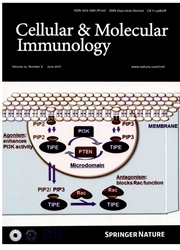

 中文摘要:
中文摘要:
CD4 + 规章的 T 细胞(Tregs ) 玩的 CD25 + 在经由显型的规定和天生、适应的有免疫力的细胞的功能维持宿主免疫者忍耐的一个重要角色。是否 allogeneic CD4 + CD25 + Tregs 能调整接受者老鼠巨噬细胞是未知的。allogeneic 施主 CD4 + 接受者老鼠居民 F4/80 ++ Tregs > 巨噬细胞用在的一个老鼠模型被调查 allogeneic 施主 CD4 + CD25 + Tregs 采纳地被变成主人 NOD-scid 老鼠的腹洞。接受者巨噬细胞的显型和功能当时是 assayed。在收到了 allogeneic CD4 ++巨噬细胞> CD25 + Tregs 显著地表示了 CD23 的高水平并且规划了房间 death-ligand 1 ( PD-L1 )并且 CD80 的底层, CD86 ,与收到了任何一个 allogeneic CD4 + CD25 − T 房间( Teffs )或没有房间。接受者老鼠的居民 F4/80 + 巨噬细胞与 allogeneic 施主 CD4 + 显著地显示的 CD25 + Tregs 和增加的 IL-10 生产增加了鸡红血房间(cRBCs ) 和 arginase 活动的吞噬作用,而这些巨噬细胞也显示出减少的 immunogenicity 和氮的氧化物(没有) 生产。部分,但是显著地堵住 arginase 颠倒了 CD4 + 关于在 vivo 的 M2 巨噬细胞的正式就职的 CD25 + Tregs。因此, allogeneic 施主 CD4 + CD25 + Tregs 能经由一条 arginase 小径部分地至少在接受者老鼠导致 M2 巨噬细胞。我们在 vivo 证据提供了支持由的未知小径 allogeneic 施主 CD4 + CD25 + Tregs 由支持 M2 巨噬细胞的区别在接受者老鼠调整?
 英文摘要:
英文摘要:
CD4+CD25+ regulatory T cells (Tregs) play an important role in maintaining host immune tolerance via regulation of the phenotype and function of the innate and adaptive immune cells. Whether allogeneic CD4+CD25+ Tregs can regulate recipient mouse macrophages is unknown. The effect of allogeneic donor CD4+CD25+ Tregs on recipient mouse resident F4/80+macrophages was investigated using a mouse model in which allogeneic donor CD4+CD25+ Tregs were adoptively transferred into the peritoneal cavity of host NOD-scid mice. The phenotype and function of the recipient macrophages were then assayed. The peritoneal F4/80+ macrophages in the recipient mice that received the allogeneic CD4+CD25+ Tregs expressed significantly higher levels of CD23 and programmed cell death-ligand I(PD-L1) and lower levels of CD80, CD86, CD40 and MHC II molecules compared to the mice that received either allogeneic CD4+CD25- T cells (Teffs) or no cells. The resident F4/80+ macrophages of the recipient mice injected with the allogeneic donor CD4+CD25+ Tregs displayed significantly increased phagocytosis of chicken red blood cells (cRBCs) and arginase activity together with increased IL-IO production, whereas these macrophages also showed decreased immunogenicity and nitric oxide (NO) production. Blocking arginase partially but significantly reversed the effects of CD4+CD25+ Tregs with regard to the induction of the M2 macrophages in vivo. Therefore, the allogeneic donor CD4+CD25+ Tregs can induce the M2 macrophages in recipient mice at least in part via an arginase pathway. We have provided in vivo evidence to support the unknown pathways by which allogeneic donor CD4+CD25+ Tregs regulate innate immunity in recipient mice by promoting the differentiation of M2 macrophages.
 同期刊论文项目
同期刊论文项目
 同项目期刊论文
同项目期刊论文
 Induction of M2-like macrophages in recipient NOD-scid mice by allogeneic donor CD4+CD25+ regulatory
Induction of M2-like macrophages in recipient NOD-scid mice by allogeneic donor CD4+CD25+ regulatory The effects of leflunomide on CD4+CD25+Foxp3+ T regulatory cells in mice receiving allogeneic bone m
The effects of leflunomide on CD4+CD25+Foxp3+ T regulatory cells in mice receiving allogeneic bone m Indoleamine 2,3 dioxygenase and regulatory dendritic cells contribute to the allograft protection by
Indoleamine 2,3 dioxygenase and regulatory dendritic cells contribute to the allograft protection by Adoptive transfer of FTY720-treated immature BMDCs significantly prolonged cardiac allograft surviva
Adoptive transfer of FTY720-treated immature BMDCs significantly prolonged cardiac allograft surviva Efficient peripheral construction of functional human regulatory CD4+CD25highFoxp3+ T cells in NOD/S
Efficient peripheral construction of functional human regulatory CD4+CD25highFoxp3+ T cells in NOD/S 期刊信息
期刊信息
